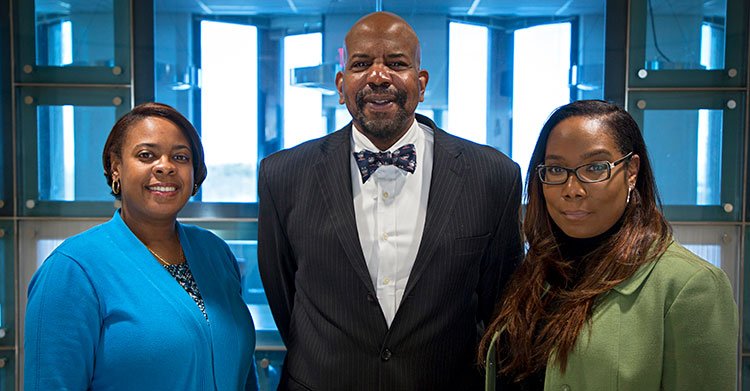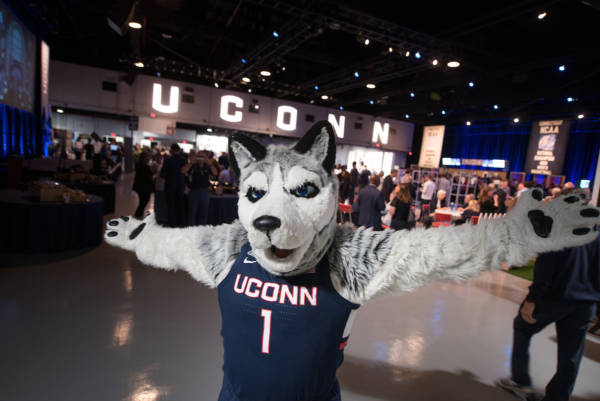Kavli Foundation Increases Investment to CICATS

Funds to be used for UConn Collaborative Research Groups
In Farmington, the Connecticut Institute for Clinical and Translational Science at UConn (CICATS) works to promote education, collaboration, and convergence research across the campus and in the community. They’ve found great success by bringing together UConn faculty, clinicians, and researchers for in-depth conversations on current scientific topics.
These informal gatherings began with an initial grant from The Kavli Foundation under their “Kavli BRAIN Coffee Hour” program. CICATS calls them Science Cafés, in honor of a national grassroots movement to foster scientific discovery and discussion. These groups cover topics that are based on CICATS’ Core Interest Groups, which range from obesity, to health disparities, to cancer control and prevention.
“We see a big need in bringing faculty, scientists, and clinicians together across the region and across the University,” said Cato T. Laurencin, M.D., Ph.D., Chief Executive Officer of CICATS. “In terms of collaboration, one of the major ways we do that is with the creation and support of CICATS Core Interest Groups throughout the University. The cafés are an important part of that because they’re a convenient meeting place for discussions to happen.”
Now, in recognition of CICATS’ initial success, The Kavli Foundation has renewed and increased their initial investment, ensuring that the cafés will continue and expand in the pursuit of advanced scientific knowledge and research.
“The Kavli Foundation seeks to catalyze cross-disciplinary dialogue and collaboration through the Kavli Coffee Hours program,” said Miyoung Chun, Executive Vice President of Science Programs at The Kavli Foundation. “We are delighted to support the CICATS Kavli Coffee Hours to promote interaction between investigators from different disciplines.”
“The Kavli Foundation has found the value that CICATS is bringing in terms of convergence, which is the coming together of different disciplines to create new ways of thinking and new science,” said Dr. Laurencin. “Their continued support with this new funding shows that we are on track with what we’re doing, in terms of being able to encourage and develop research opportunities here at the University.”
One of the biggest success stories comes from the Personalized Immunotherapy Core Interest Group, led by Pramod Srivastava, Ph.D., M.D., Director of the Carole and Ray Neag Comprehensive Cancer Center and the Center for Immunotherapy of Cancer and Infectious Diseases. The support and funding through CICATS helped Dr. Srivastava advance his groundbreaking vaccine to treat ovarian cancer.
“We’ve done a lot of high-profile activities over the past several years that have translated into a return on investment that goes beyond dollars and cents,” said Dr. Linda K. Barry, M.D., FACS, Assistant Director and Chief Operating Officer, CICATS. “We’ve invested in our faculty and facilitated new partnerships that have translated into increased publications and increased grants. The support we’ve received from The Kavli Foundation will allow us to continue these efforts – a win-win for UConn and the communities we serve.”
Fostering collaborative research is just one aspect of CICATS’s mission. CICATS also works alongside community partners to address health disparities and mentors established, emerging, and future scientists from underrepresented groups.
“We strongly believe in mentoring – and in developing future mentors as well,” said Dr. Laurencin. “We have the M1 Mentoring Program, which specifically trains and develops individuals to work as mentors for minority individuals across the institution. We’ve also focused on workforce development with our Young Innovative Investigator Program, which develops the next generation of clinical scientists.”
CICATS is seeing significant momentum with their work. They’ve graduated the first class of Young Innovative Investigators and are expecting the new incoming class shortly. CICATS is a recipient of a National Institutes of Health (NIH) BUILD Award aimed at developing a national pipeline of underrepresented scientists. More recently, the organization’s 2nd Annual National Health Disparities Elimination Summit was highly successful, as nearly 300 people came together from across the region and the country to discuss health topics affecting communities nationwide including asthma, environmental justice, and gun violence in urban communities. CICATS remains focused on improving community health and developing the scientists and researchers of tomorrow.
“I think we’ve had great results with our work,” said Dr. Laurencin. “We’re delighted with where we are as an organization and where we’re going moving forward.”
Learn more about CICATS programs, research resources, and services at cicats.uconn.edu.
The Kavli Foundation is an organization dedicated to the goals of advancing science for the benefit of humanity and promoting increased public understanding and support for scientists and their work. To learn more, visit kavlifoundation.org.
